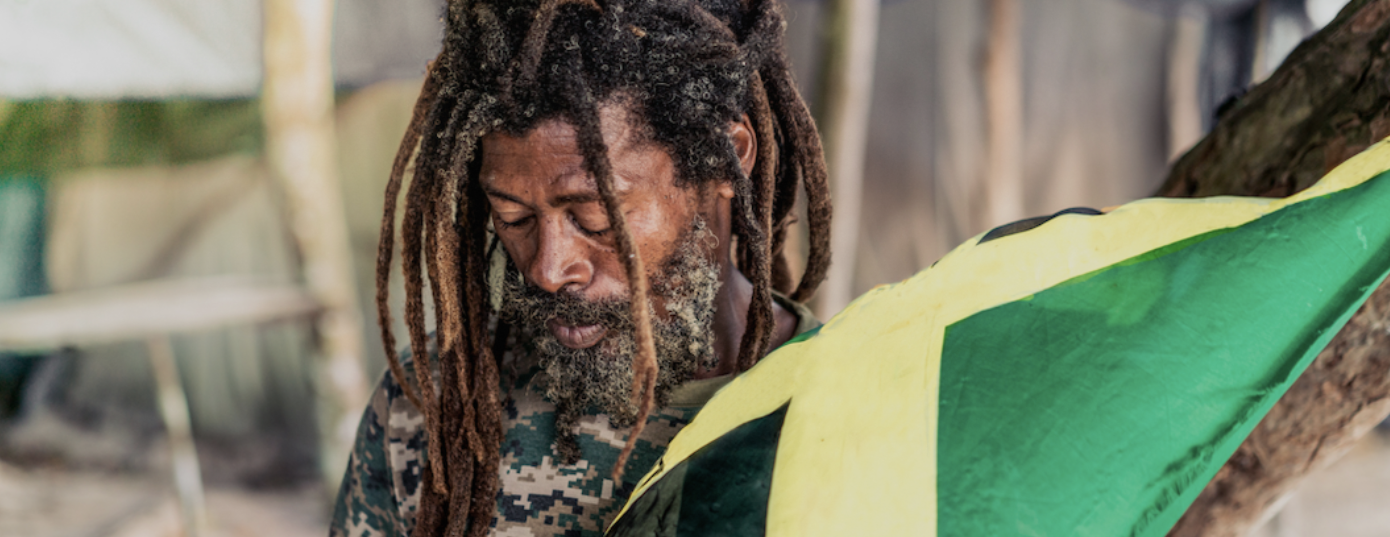When most people think of Rastafarianism, they think of Bob Marley, weed and dreadlocks. But there are many who don’t know that Rastafari is a religious and political movement, with its own beliefs, history and philosophy. So if you’re curious, read on and find out what Rastafarianism is all about.
Let’s start with some history. Where did Rastafarianism come from?
Rastafari, which can also be spelled Ras Tafari, is a religious and political movement that started in Jamaica around the 1930s, but its roots can be traced back as far as the 18th century. Back then, Ethiopianism and movements that centered Africa and African consciousness became popular amongst Black Africans and the enslaved Black people in the Americas.
For those that don’t know much about Ethiopia, it is the only African nation that has never been colonized. In the 18th century, African Christians were dissatisfied with the racism within the Church, and desired a more African and relevant Christianity. Especially since Christianity was used by White people as a tool for colonization. The White ruling class favored interpretations of the Bible that served their agenda, to justify their colonization efforts and, in the Americas, their economic pursuits that required African people and their descendants to remain enslaved.
Because of this, African Christians preferred their own interpretation of the Holy Scriptures, finding a deep connection to the Exodus. With their new Afro-centric Christianity, they also wished to restore tribal life, and more political and cultural autonomy. This desire was coined in the slogan “Africa for the Africans”, which was central to Ethiopianism.
In the Bible, Ethiopia was mentioned often, under the name of Cush or Kush. African Christians found many quotes within the Bible that exalted the nation, such as Psalm 68:31: “Princes shall come out of Egypt, and Ethiopia shall soon stretch out her hands to God.” So for many, Ethiopia became the new Promised Land, idealized as an African Zion.
As you can see, Rastafarianism is intrinsically linked to the struggle of the enslaved people of African descent. They believe that they are being tested by Jah (God) through slavery and the existence of their economic injustice and racial “downpression” (instead of calling it oppression).
There are two important figures in the 19th century that played key roles in the rise of Rastafarianism. One of them is the Jamaican political activist and Black nationalist Marcus Garvey. Garvey is well known for his teachings on Black empowerment, as well as his powerful speeches and the Universal Negro Improvement Association (UNIA), which he founded in 1914. He believed that all Black people should return to their rightful homeland, Africa. This is where the key belief of repatriation of the Rasta comes from.
Though Garvey was not a follower or believer of Rastafarianism, his teachings greatly influenced the religion and movement. But most importantly, he is viewed as a prophet. In 1920, Garvey exhorted people to "Look to Africa, when a black king shall be crowned, for the day of deliverance is at hand”.
On November 2, 1930, Ras Tafari Makonnen was crowned Emperor Haile Selassie I of Ethiopia. He is the second, and most relevant figure in Rastafarianism, as he is believed to be a descendant of King Solomon and the Queen of Sheba. Selassie assumed the titles of King of Kings, Lord of Lords, and the Conquering Lion of the Tribe of Judah. His ascension to the throne was believed to fulfill the prophecy stated by Garvey ten years prior. He is regarded as the second coming of Christ, who has come to redeem all Black people. And so, Rastafarianism in Jamaica came to be.
What do modern Rastafari believe in?
It’s been 92 years since this religion solidified into existence. They don’t have a specific creed, and the views can differ depending on the different groups. There are three main orders, which are called Boba Shanti, Nyahbinji and the Twelve Tribes. Two common principles shared by all Rastas include; the exalted status of Haile Selassie I and the rejection of white Eurocentric images of divinity.
Originally, the key beliefs of Rastafarianism were very racialized, as is to be expected of the religious system of an oppressed people living in exile. Hatred and revenge towards White people were considered basic tenets. But the religion has evolved since then, and in 1991, theologian Michael N. Jagessar published his study of the Rastafari religion. His publication provided insight into the current beliefs of the Rastafari, and he summarized it into ten key ideas:
- The humanity of God and the divinity of man.
- God is found within every man, which is how God makes himself known through humanity. This belief also exalts Selassie I, as he is perceived to be the one man in whom “God exists most eminently and completely”.
- God in History, which invites believers to examine all historical facts in the context of God’s judgment and workings.
- Salvation is on Earth, and it is not a heavenly idea.
- The supremacy of life, and the protection of it.
- Respect for nature, including animals and the environment, which is reflected in their food laws.
- The power of Speech, as this enables the presence and power of God to be felt.
- Evil is corporate
- Judgment is near
- The priesthood of Rastafarians, as they are the chosen people of God to promote his power and peacefulness.
Now that we know the history and the core beliefs of Rastafarianism, you might be wondering… where does marijuana come in?
Every religion has its own set of practices or rituals that their believers partake in. Rastafarianism is no different. Though they have no physical church, Rastafarians usually meet weekly in a believer’s home or in a community center. These meetings are called Reasoning sessions.
During these sessions, believers discuss any issues that are relevant to the community, and they also chant, pray, meditate and sing. The music used at these meetings is known as Nyabingi, and it largely consists of chanting and drumming to reach states of heightened spirituality. It’s a blend of 19th century Gospel music and traditional African drumming, with strong themes of Black redemption and repatriation. This is also where reggae has its roots.
These meetings can also include large feasts, which are subject to the Rastafari food laws. Diet is an important part of the Rastafari religion, since they are conscious of the impact they may have on the environment. The believers are largely vegetarian, although they may occasionally eat fish under 20 cm in length.
Marijuana, also called ganja, has an important role in these Reasoning sessions. Cannabis is viewed as a holy herb, used to heighten the feelings of community and produce visions “of a religious and calming nature” during their meditations.
The Rastafari think that the use of marijuana is sacred, and many believe that it shouldn’t be abused. Since the consumption of cannabis is highly ritualized, Rastafari have to say a prayer before it is used: “Glory be to the father and to the maker of creation. As it was in the beginning is now and ever shall be World without end: Jah Rastafari: Eternal God Selassie I.”
Originally, the Rastafarians first began using Marijuana in reaction to the poor treatment of Black people in society. According to Rastafari scholar Leonard Barrett, it was a reactionary device that enabled freedom from the establishment. It was a symbol of the counterculture and their resistance against the powers that downpress them.
The Rastafari justify their sacred use of cannabis with some passages of the bible, such as Psalm 104:14. “He causeth the grass for the cattle, and herb for the services of man.” Another example is Proverbs 15:17, which states “Better is a dinner of herb where love is, than a stalled ox and hatred therewith.” However, not all Rastafari smoke marijuana, and not all of them do outside of Reasoning sessions.
It is also within their interpretations of the Bible where they find stories like Samson’s, and verses such as Numbers 6:5 (“All the days of his vow of separation no razor shall pass over his head. He shall be holy until the days are fulfilled for which he separated himself to the Lord; he shall let the locks of hair on his head grow long”), to justify the importance of dreadlocks. This is why Rastafarian men don’t shave their heads or their beards, as they represent their strength and devotion to God.
There is so much more to Rastafarianism than just dreadlocks, reggae and weed. A lot of people’s negative perception of this religion and movement is rooted in racism, and in their fear of the political ramifications of Rasta. Rastafarians have been persecuted by the Jamaican government, and have faced a lot of negative attention from law enforcement due to their appearance, and anti-corporation and anti-establishment points of view. Nowadays, a lot of Rastas are still fighting for their religious and economic freedom, and are involved in the movement for the legalization of marijuana in several countries, focused on their freedom of worship. Outside of their cannabis activism, they are largely absent from the political arena.
At its core, we can see that Rastafarianism is a religion that promotes peace, self-reliance, eco-consciousness, and an end to racial and economic oppression. It has no leaders, official creed or spokespeople, but they are still a very tight-knit community. Their cultural impact has been far-reaching, and inspiring to other communities around the world.
Author: Kite
Rastafari | History, Beliefs, & Facts | Britannica. Retrieved from https://www.britannica.com/topic/Rastafari
BBC - Religions - Rastafari: Worship and customs. Retrieved from https://www.bbc.co.uk/religion/religions/rastafari/customs/customs_1.shtml
BBC - Religions - Rastafari: Rastafarian music. Retrieved from https://www.bbc.co.uk/religion/religions/rastafari/customs/music.shtml
BBC - Religions - Rastafari: Original and modern beliefs Retrieved from: https://www.bbc.co.uk/religion/religions/rastafari/beliefs/beliefs_1.shtml
Learn more about Rastafarian use of Marijuana (Ganja) and other symbols. - Jamaicans and Jamaica . Retrieved from: https://jamaicans.com/ganja/
Rastafarianism - History. Retrieved from https://www.history.com/topics/religion/history-of-rastafarianism
BBC - Religions - Rastafari: Marcus Garvey Retrieved from: https://www.bbc.co.uk/religion/religions/rastafari/people/marcusgarvey.shtml
Rastafarians - Minority Rights Group Retrieved from: https://minorityrights.org/minorities/rastafarians/


0 comments